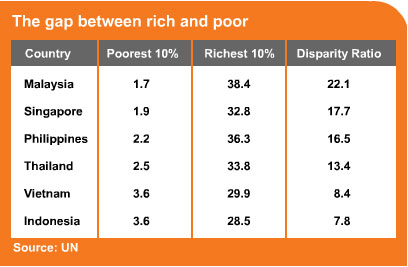
10 percent in Malaysia earn 22 times more than the poorest 10 percent
Richest 10 percent in Malaysia controls 38.4 percent of the country’s economic income as compared to the poorest 10 percent controlling 1.7 percent.
"Over the past 30 years, Malaysia has made great strides in slashing absolute poverty, from 58.6 percent of families in rural areas and 24.6 percent in urban areas in 1970 to 11.4 percent for rural areas and 2 percent for urban areas in 2002. Nevertheless, the figure has been criticised as the poverty line is fixed at RM529 in Peninsular Malaysia, RM600 in Sarawak and RM690 in Sabah, for each family - an amount which is far too low, especially for those who are living in urban areas." ** Note last year (2205) this Gross Poverty Line Income(PLI) was revised at last overall poverty ranged today from RM634 (Johor) to RM888 (Sabah), and from RM367 (Perlis) to RM503 (Sabah) for the hardcore poverty category.
**************************************
M’sia has worst income disparity in SEA, gov’t flayed
Feb 2, 05 5:42pm
Malaysia has the distinction of being the country with the worst income disparity in Southeast Asia, according to a United Nations report.
The latest United Nations Human Development Report 2004 shows the richest 10 percent in Malaysia earn 22 times more than the poorest 10 percent, resulting in the country having one of the worst income disparity in Asia.
According to the report, the richest 10 percent in Malaysia controls 38.4 percent of the country’s economic income as compared to the poorest 10 percent controlling 1.7 percent.
Economic income is generally defined as the income derived by an individual or family, and it includes gross wages as well as any appreciation or depreciation of one’s net assets.
Malaysia’s top 10 percent of the population is 22.1 times richer than the poorest 10 percent. The country’s income gap is higher than Singapore (17.7 times), the Philippines (16.5), Thailand (13.4), Vietnam (8.4) and Indonesia (7.8).
Helping the rich
DAP leader Lim Guan Eng, who is an accountant by training, has a ready explanation for this sad state of economic affairs.
“Such unequal and unfair distribution of wealth is caused by (ruling coalition) BN’s (Barisan Nasional) pro-rich economic focus of producing more bumiputera millionaires instead of creating wealth that can be enjoyed by all Malaysians,” he said.
Lim gave the example of Malacca Chief Minister Mohd Ali Rustam (left), who boasted in the state assembly last October that he had created 10 bumiputera millionaires since 1999.
“When DAP Melaka opposition leader Betty Chew asked whether it is better to have 1,000 Malaysians with RM10,000 instead of only 10 persons sharing RM 10 million, the chief minister preferred the 10 millionaires to the 10,000 ordinary Malaysians,” he lamented.
Lim, who is DAP secretary-general, argued that “economic wealth should be distributed to all deserving Malaysians and not to produce the few millionaires, whether bumi or non-bumis, who are beneficiaries of crony capitalism”.
Enriching crony companies
The opposition leader pointed out how government policies help enriched certain well-connected companies at the expense of Malaysian taxpayers.
This include the generous terms given to the North-South Expressways (Plus), allowing the company to increase the highway toll rates by 10 percent every three years.
“Plus made RM760 million in 2004 before the toll increase and will add an extra RM154 million from the 10 percent toll hike to record a RM937 million profit in 2005.
“Despite such huge profits not one cent goes to Malaysian taxpayers as Plus is exempted from the 28 percent corporate income tax. Additionally, interest payments is waived for Plus RM1.65 billion loan from the Malaysian government.”
Over the past 30 years, Malaysia has made great strides in slashing absolute poverty, from 58.6 percent of families in rural areas and 24.6 percent in urban areas in 1970 to 11.4 percent for rural areas and 2 percent for urban areas in 2002.
Nevertheless, the figure has been criticised as the poverty line is fixed at RM529 in Peninsular Malaysia, RM600 in Sarawak and RM690 in Sabah, for each family - an amount which is far too low, especially for those who are living in urban areas.
But while Malaysia has done well in reducing absolute poverty, relative poverty has since ballooned.
“Prime Minister Abdullah Ahmad Badawi should prove his commitment towards economic justice by creating and distributing wealth for all,” said Lim.





No comments:
Post a Comment